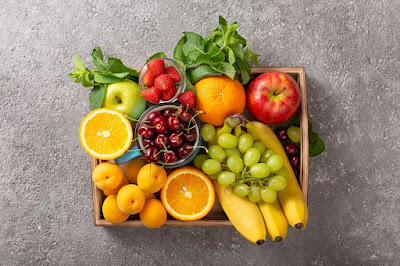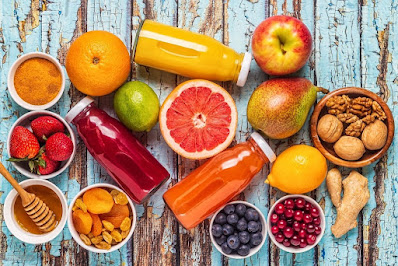Fruits: Health benefits of eating fruits, Nutritional benefits of fruits, Importance of fruits in the diet
Fruits are nature’s way of providing us with essential nutrients and vitamins that are essential for our body’s overall health. Eating fruits on a daily basis can help us maintain good health and reduce the risk of chronic diseases such as heart disease, stroke, and diabetes.
According to HARVARD .T.H. CHAN,
At least nine different families of fruits and vegetables exist, each with potentially hundreds of different plant compounds that are beneficial to health. Eat a variety of types and colors of produce in order to give your body the mix of nutrients it needs. This not only ensures a greater diversity of beneficial plant chemicals but also creates eye-appealing meals.
In this blog, we’ll explore the many benefits of fruits and why they should be a part of your daily diet.
I. Fruits are packed with essential nutrients
When it comes to promoting good health, nature has gifted us with an abundance of nutrient-rich fruits. Packed with essential vitamins, minerals, antioxidants, and fiber, these fruits offer a delicious way to nourish our bodies and support overall well-being.
1. The Power of Vitamin C:
Vitamin C plays a crucial role in supporting a healthy immune system and collagen production. Citrus fruits such as oranges, lemons, and grapefruits are well-known for their high vitamin C content. Additionally, strawberries, kiwis, and pineapples are excellent sources of this powerful antioxidant. Including these fruits in your diet can help boost your immune system and protect against oxidative stress.
2. Essential Fiber from Berries:
Berries, including blueberries, raspberries, and blackberries, are not only delicious but also rich in dietary fiber. Fiber aids in digestion promotes feelings of fullness, and helps regulate blood sugar levels. Adding a handful of berries to your meals or snacks can provide a satisfying dose of fiber along with antioxidants that support brain health and reduce the risk of chronic diseases.
3. Potassium for Heart Health:
Potassium is an essential mineral that plays a vital role in maintaining heart health and regulating blood pressure. Bananas are a popular fruit known for their potassium content, but other fruits like avocados, cantaloupes, and apricots also contain significant amounts of this beneficial mineral. Including these fruits in your diet can help promote a healthy cardiovascular system and maintain proper fluid balance.
4. Nutrient-Dense Citrus Fruits:
Citrus fruits not only provide a refreshing burst of flavor but also offer a wide range of nutrients. Oranges, for example, are an excellent source of vitamin C, folate, and thiamine. They also contain dietary fiber and various antioxidants. Grapefruits, tangerines, and clementines are other citrus fruits that provide similar health benefits. Adding these fruits to your diet can enhance your nutrient intake and support your overall well-being.
5. Antioxidant-Rich Tropical Fruits:
Tropical fruits like mangoes, papayas, and guavas are known for their vibrant colors and tropical flavors. These fruits are not only delicious but also packed with antioxidants like vitamin C, beta-carotene, and lycopene. Antioxidants help protect cells from damage caused by free radicals and have been associated with a reduced risk of chronic diseases. Including tropical fruits in your diet can provide a delightful way to boost your antioxidant intake and support overall health.
II. Fruits can help reduce the risk of chronic diseases
Incorporating a variety of fruits into your daily diet is not only delicious but also offers numerous health benefits. One significant advantage is their potential to reduce the risk of chronic diseases.
1. The Link Between Fruits and Chronic Disease Prevention:
Research consistently shows that a diet rich in fruits is associated with a reduced risk of chronic diseases such as heart disease, stroke, type 2 diabetes, and certain types of cancer. Fruits are abundant in essential vitamins, minerals, antioxidants, and dietary fiber, which collectively contribute to their protective effects. Let's explore some key ways in which fruits can help reduce the risk of chronic diseases.
2. Powerful Antioxidants in Fruits:
Fruits are packed with antioxidants, which are compounds that help neutralize harmful free radicals in the body. Free radicals can cause oxidative stress, leading to cell damage and an increased risk of chronic diseases. Antioxidants, such as vitamin C, vitamin E, and various phytochemicals found in fruits, help combat oxidative stress, reduce inflammation, and support overall health.
3. Heart-Healthy Benefits:
A diet rich in fruits has been linked to a lower risk of heart disease. Many fruits, such as berries, oranges, and grapes, contain high levels of flavonoids, which have been shown to improve heart health by reducing blood pressure, lowering cholesterol levels, and enhancing blood vessel function. Additionally, the fiber content in fruits aids in maintaining healthy blood sugar levels, further reducing the risk of heart disease.
4. Reducing the Risk of Cancer:
Certain fruits have demonstrated protective properties against various types of cancer. For instance, berries, particularly blueberries, and raspberries, are rich in antioxidants and have been associated with a decreased risk of certain cancers, including colon, breast, and prostate cancer. Citrus fruits, such as oranges and lemons, contain compounds that may help prevent certain types of cancer, thanks to their high vitamin C content.
5. Managing Type 2 Diabetes:
Fruits are an excellent choice for individuals with or at risk of developing type 2 diabetes. Their natural sugars are accompanied by fiber, which helps regulate blood sugar levels and prevents sharp spikes. Furthermore, the nutrients and antioxidants in fruits contribute to improved insulin sensitivity and reduced inflammation, both crucial factors in managing and preventing type 2 diabetes.
Also read:- What Fruits Are Good For Diabetics?
III. Fruits can help with weight management
Fruits are rich in essential vitamins, minerals, antioxidants, and dietary fiber, making them a powerhouse of nutrition. They are naturally low in calories, fat-free, and packed with water content, which adds volume to your meals without significantly increasing calorie intake. This makes fruits an ideal choice for weight management as they provide a satisfying and nutritious option.
1. Fruits and Weight Management:
- High in Fiber: Fiber plays a crucial role in weight management by promoting feelings of fullness and preventing overeating. Fruits, such as apples, pears, and berries, are excellent sources of dietary fiber. Including fiber-rich fruits in your meals and snacks can help control hunger, reduce calorie intake, and support healthy weight loss.
- Low in Calories: Fruits are generally low in calories, making them a smart choice for those watching their weight. Instead of reaching for calorie-dense snacks, opt for fruits as a satisfying alternative. Their natural sweetness can satisfy cravings while providing essential nutrients, all without sabotaging your calorie goals.
- Hydration and Satiety: Many fruits have high water content, which helps keep you hydrated and promotes a feeling of fullness. When you feel full and satisfied, you're less likely to overeat or snack on unhealthy foods. Hydration is vital for overall health and can also aid in digestion and metabolism.
Incorporating Fruits into Your Diet:
- Variety is Key: To maximize the nutritional benefits, aim to include a variety of fruits in your diet. Explore different options such as apples, oranges, bananas, berries, grapes, and tropical fruits. Each fruit offers unique vitamins, minerals, and antioxidants, ensuring a diverse range of health benefits.
- Snack Smart: Replace unhealthy, calorie-laden snacks with fresh fruits. Keep a bowl of washed and cut fruits readily available for quick and convenient snacking. This way, you'll reach for a nutritious option when hunger strikes.
- Add to Meals and Recipes: Incorporate fruits into your meals and recipes to boost both flavor and nutrition. Add berries to your breakfast oatmeal, top salads with slices of citrus fruits, or blend fruits into smoothies for a refreshing and nutrient-packed treat.
- Freeze for Desserts: Instead of reaching for high-calorie desserts, freeze ripe bananas or blend them with other fruits to create delicious and guilt-free frozen treats. These homemade "nice creams" are not only satisfying but also packed with vitamins and minerals.
Also read:- How Many Calories Should I Eat a Day?
IV. Fruits can help improve skin health
Among nature's bountiful offerings, fruits stand out as exceptional allies for improving skin health. Packed with essential nutrients, antioxidants, and hydration, fruits play a vital role in nourishing our skin from within.
1. Rich in Antioxidants:
Fruits are bursting with antioxidants, including vitamins A, C, and E, as well as various phytochemicals. These antioxidants help combat free radicals, which can damage skin cells and contribute to premature aging. By incorporating antioxidant-rich fruits into your diet, you can protect your skin from oxidative stress and maintain a youthful appearance.
2. Hydration and Moisture:
Many fruits have high water content, making them excellent hydrating agents for the skin. Proper hydration is crucial for maintaining a healthy complexion, as it helps improve skin elasticity, reduce dryness, and promote a radiant glow. Fruits like watermelon, oranges, and cucumbers are particularly hydrating and can contribute to plump, supple skin.
3. Nutrient Powerhouses:
Fruits are packed with essential vitamins, minerals, and fiber that support overall skin health. For instance, berries are rich in vitamin C, which aids in collagen production and helps maintain firmness. Citrus fruits provide a boost of vitamin A, promoting cell turnover and a smoother complexion. Additionally, the high fiber content in fruits aids digestion and detoxification, which can lead to clearer skin.
4. Anti-Inflammatory Properties:
Certain fruits possess potent anti-inflammatory properties that can help calm irritated skin conditions, such as acne or eczema. Pineapple and papaya, for example, contain enzymes that gently exfoliate the skin, reduce inflammation, and promote a more even skin tone. By incorporating these fruits into your skincare routine or diet, you can achieve a clearer and more balanced complexion.
Best Fruits for Healthy Skin:
Berries:
Blueberries, strawberries, and raspberries are rich in antioxidants, vitamins, and fiber, promoting collagen production and reducing inflammation.
Citrus Fruits:
Oranges, lemons, and grapefruits are packed with vitamin C, which brightens the skin, improves texture, and reduces the appearance of blemishes.
Watermelon:
This refreshing fruit is not only hydrating but also contains lycopene, which protects the skin from sun damage and promotes a youthful complexion.
Papaya:
Known for its enzymes, papaya gently exfoliates and rejuvenates the skin, revealing a smoother and more radiant appearance.
Avocado:
This creamy fruit is a great source of healthy fats, vitamin E, and antioxidants, providing nourishment and promoting a supple, moisturized complexion.




.jpeg)



Post a Comment